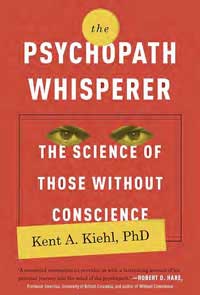 304 pages
304 pages8 CE credits
Course Enrollment
$200.00
Add to Cart
All exams are taken online. The exam for this course will be available in "My Courses" immediately upon enrollment. Note the book is not included.
The book is available for purchase from Amazon.
As an Amazon Associate we receive a rebate from qualifying purchases.
THE PSYCHOPATH WHISPERER
The Science of Those Without Conscience
Kent A. Kiehl, Ph.DBroadway Books, 2015
DESCRIPTION
A compelling journey into the science and behavior of psychopaths, written by the leading scientist in the field of criminal psychopathy. We know of psychopaths from chilling headlines and stories in the news and movies, from Ted Bundy and John Wayne Gacy, to Hannibal Lecter and Dexter Morgan. As Dr. Kent Kiehl shows, psychopaths can be identified by a checklist of symptoms that includes pathological lying; lack of empathy, guilt, and remorse; grandiose sense of self-worth; manipulation; and failure to accept one's actions. But why do psychopaths behave the way they do? Is it the result of their environment? how they were raised? or is there a genetic component to their lack of conscience?
This is the question Kiehl, a protege of famed psychopath researcher Dr. Robert Hare, was determined to answer as he began his career twenty years ago. To aid in his quest to unravel the psychopathic mind, Kiehl created the first mobile functional MRI scanner to study psychopaths in prison populations. The brains of more than five hundred psychopaths and three thousand other offenders have been scanned by Kiehl's laboratory the world's largest forensic neuroscience repository of its kind. Over the course of The Psychopath Whisperer, we follow the scientific bread crumbs that Kiehl uncovered to show that the key brain structures that correspond with emotional engagement and reactions are diminished in psychopaths, offering new clues to how to predict and treat the disorder.
In The Psychopath Whisperer, Kiehl describes in fascinating detail his years working with psychopaths and studying their thought processes? from the remorseless serial killers he meets with behind bars to children whose behavior and personality traits exhibit the early warning signs of psychopathy.
Less than 1 percent of the general population meets the criteria for psychopathy. But psychopaths account for a vastly outsized proportion of violent crimes. And as Kiehl shows, many who aren't psychopaths exhibit some of the behaviors and traits associated with the condition. What do you do if you discover your roommate, or boss, or the person you are dating has traits that define a psychopath? And what does having a diminished limbic region of the brain mean for how the legal system approaches crimes committed by psychopaths?
A compelling narrative of cutting-edge science, The Psychopath Whisperer will open your eyes on a fascinating but little understood world, with startling implications for society, the law, and our personal lives.
The reader will be able to:
• Describe the 20 criteria of psychopathy
• Explain how to score the Hare Psychopathy Checklist Revised, item by item
• Review the history of psychopathy assessment research
• Explain the differences between psychosis and psychopathy
• Consider the importance of collateral file information in diagnosis
• Compile a list of the difficulties of making a diagnosis based only on interview
• Research and describe other issues in psychopathy and recidivism, such as those involving teenagers and incarcerated violent criminals
AUTHOR
Kent A. Kiehl, PhD, is an executive science officer of the nonprofit Mind Research Network and a professor of psychology, neurosciences, and law at the University of New Mexico. In addition to authoring more than 130 articles in peer-reviewed publications, Kiehl has written for Scientific American, has appeared on NPR, and was profiled by John Seabrook in The New Yorker. He currently directs five major NIH-funded projects in psychopathy and related mental illnesses. He lectures extensively to state and federal judges, lawyers, correctional officials, and lay audiences about the intersection of neuroscience and the law.
EDITORIAL REVIEWS"A world-renowned researcher of psychopaths delves into the origins of their behavior, especially as it relates to the inner workings of the brain...Navigates these issues and more with compassion and insight. Fast-paced and thrilling."
-- Kirkus Reviews
"In this compassionate study, Kiehl, professor of psychology, neurosciences, and law at the University of New Mexico, attempts to provide a way to understand and improve the lives of psychopaths...Kiehl's goal is not to sensationalize, but rather to learn and assist...His pedigree speaks volumes: he has devoted a good portion of his career to this oft-maligned population."
-- Publishers Weekly
"A renowned neuroscientist provides us with a fascinating account of his personal journey into the mind of the psychopath."
-- Robert D. Hare, Professor Emeritus, University of British Columbia, author of Without Conscience
"A lucid and closely observed portrait of what psychopaths are actually like, with their chilling combination of moral apathy and charm, by one of the leading researchers and innovators in the field. A Fascinating and terrifying book, and a potential life saver."
--John Seabrook, The New Yorker
"A must read! Dr. Kiehl's stories about psychopaths are as authentic as can be. I found Dr. Kiehl's research formed the backbone of my work in analyzing the behavioral signature of a psychopath left behind at the crime scene. Whether you work in mental health, law enforcement, the judiciary or research, don't trust your gut about this disorder–learn about it from one of the foremost experts in the field."
--Mary Ellen O'Toole, Special Agent (retired), Behavioral Analysis Unit (BAU), Federal Bureau of Investigation (FBI).
ISHK CE at Home
1702-L Meridian Ave., #266
San Jose, CA 95125-5586
This website uses cookies to ensure you get the best experience on our website. Learn more
